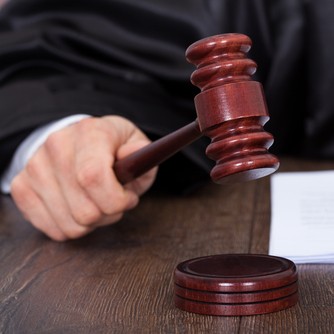Law school clinic wins reversal of 1993 conviction based on prosecutor’s remarks about 'trickster lovers'

Image from Shutterstock.
A prosecutor’s closing argument about sadomasochistic “trickster lovers” made a 1993 sexual assault trial so fundamentally unfair that the conviction should be reversed, a federal appeals court has ruled.
In an amended Sept. 7 opinion, the 4th U.S. Circuit Court of Appeals at Richmond, Virginia, reversed the second-degree sexual assault conviction of Charles Plymail, Law.com reports. He was represented by a law professor with the help of his students at the Wake Forest University School of Law’s Appellate Advocacy Clinic.
Plymail had met his accuser in a bar before she accompanied him to his apartment. They both agreed that they had consensual sex twice. But the woman said Plymail became aggressive when she wanted to leave, slapping her and forcing her to perform sexual acts. She kicked him, yelled for help and ran out of the apartment. A neighbor wrapped the naked woman in a sheet and called 911.
Plymail, however, claimed that the woman bit him during consensual sex, and he slapped her in response.
The prosecutor had made the improper remarks in rebuttal following improper statements by the defense lawyer, who argued that a rape charge is easy to make but difficult to defend against. It is easy, the defense lawyer argued, for an “angry, offensive” woman to harm innocent men.
The prosecutor responded, warning the jury about “trickster lovers” who disguise themselves to “the jury’s own sons and daughters” as well-intentioned people but have a “sweet tooth … for masochistic, sadomasochistic horror,” the appeals court said in an opinion by Judge Julius Richardson.
The prosecutor told jurors that a verdict would send one of two messages: that the community won’t condone such behavior or that sadomasochistic people are free to do as they pleased. The verdict should be “guilty … for all of us, for womankind, for all of us,” the prosecutor said.
Rather than countering improper statements with more improper statements, the prosecutor should have objected to the defense argument, the appeals court said. The prosecutor’s arguments were so improper as to deny due process to Plymail, Richardson said.
“Reviewing this closing, even 25 years later and on the cold record, leaves us with no doubt of its power,” Richardson wrote. “Who is against ‘womankind’? Who seeks to grant a license to those with ‘the sweet tooth of sadomasochism’ to have their way with our daughters as they enter college? Who wishes to send a message to the community that men may have their way with women, that rapists may go free, that women will not be protected? For the same reason it was powerful, it was highly improper.”
The court said Plymail’s appeal efforts were “an ordeal spanning over 20 years, six lawyers and multiple state courts. Many delays stemmed from disagreements with the attorneys, difficulty contacting them, various courts taking too long to rule on simple motions, and Plymail’s battle with ulcerative colitis.”
Law.com spoke with John Korzen, a legal writing professor at Wake Forest University’s law school who led the habeas appeal.
“We were pleased by the court’s opinion, including that it was published and unanimous,” Korzen told Law.com. “The opinion is one fine example of many over the years in which the 4th Circuit has acted to protect the fairness of criminal prosecutions at the trial level, whether due process violations by prosecutors as in this case and others or ineffective assistance of defense counsel in still others.”



